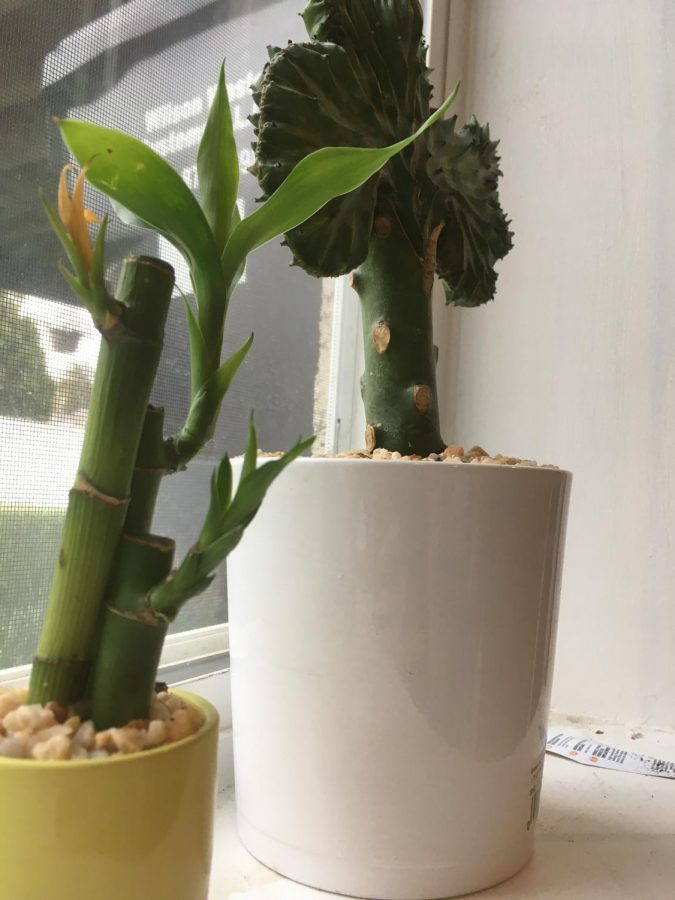The Benefits of a Houseplant
Houseplants are a common decorative tool, but there’s so much more to it than decoration.
Bamboo plants are easy to take care of, and look very homey. Crested euphorbia are slow growers and offer a unique look.
It’s common knowledge that having some sort of companion is beneficial to the mental health of a person. Usually, this refers to a pet, but what about having something that can’t physically interact with you? There’s lots of scientific evidence and personal experience that shows that having a houseplant or growing some kind of plant is hugely beneficial to mental health. There are a few things that make plants so nice to have. The simple satisfaction of watching something grow or flourish naturally ensues a feeling of pride and accomplishment and the connection to nature that having a plant gives us.
“It’s a good natural decoration to lighten up the room. Owning a plant can definitely teach you more about responsibility because it’s like taking care of a child, but on a much lower scale,” Minh Ngo (23′) said.
A study by Catharine Ward Thompson in 2012 found that those who had plants experienced less stress and engaged in more physical activity and that the majority of green space on people had positive results. The indoor and outdoor care of plants encourages physical and mental wellbeing, because of the care and desire to watch this organism grow. It makes you more attentive and improves your memory, as many of the things that come with caring for a plant require to build on these skills.
“Not only do indoor plants enhance the overall appearance of a space, but they’ve been shown to boost moods, increase creativity, reduce stress, and eliminate air pollutants, making for a healthier, happier you. Indoor plants don’t just look good they can make us feel good, too,” Zoe Baker (’24) said.
Nature has always been and will be core to what it means to be human. Every day since the beginning of our lives we interact with nature, and having a plant is a wonderful way to connect yourself further with nature. It’s such an important thing to appreciate the natural world, having your own plant is a perfect way to start.
“It makes you be more motivated to do something as you have to keep more than yourself alive,” Kaitlyn Ryberg (’24) said.
After reviewing what makes having plants so beneficial to our mental and physical health, what’s a good place to start? There are so many wonderful types of plants in the world of horticulture, but some plants are specific to mental wellbeing or beginners to owning a plant. To begin with, an Aloe vera plant is not only a good plant to have but is very easy to care for. Aloe vera is a plant that herbally treats burns, cuts, and inflammation, so the plant has physical benefits that while can be harnessed, is just something that is nice and easy to grow. An Aloe vera plant is a relatively low-maintenance plant but can grow to a large size. Direct or indirect sunlight and a weekly watering can keep this plant in high spirits.
“I have a few succulents because they’re easy to tend to, I have a moss garden that I think is very cute, and I have a tiny herb garden because I use the spices and I don’t have to buy more,” Nevaeh Barrett (’23) said.
Another idea is lavender, a gorgeous plant that smells wonderful and has antiseptic and anti-inflammatory properties. Lavender is commonly used in essential oils and candles, because of its soothing scent. Lavender is a plant that flourishes in a bright area and needs to be watered when soil is dry. Overwatering can severely damage the growth of the plant, though.
“They make your home seem more inviting, I feel like, and they just make it more homely,” Isabelle Kallbrier (’24) said.
All in all, I sincerely hope that this made you think about having a plant, or at the least, made you think about how important it is to be connected to nature. Whether it be planting wildflowers when Spring comes around, buying a succulent plant, or just going on a walk around the woods, make space for nature, and make time to appreciate it.








AnnaBell Crosson • Nov 4, 2020 at 2:15 PM
So true lavender is so calming and makes me feel especially relaxed.
Love the article